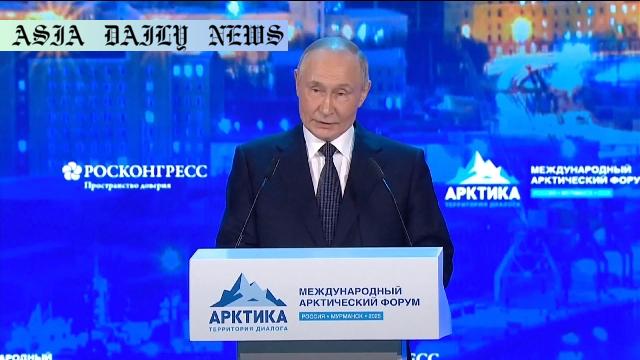Arctic tensions rise as Russia monitors NATO’s involvement and the US expresses interests in Greenland’s potential acquisition.
Putin recognizes the increasing importance and competition in Arctic geopolitics.
Expressed Russia’s concern over US intentions to acquire Greenland.
Highlighted NATO’s recent Arctic activities, including Sweden and Finland’s membership.
Russia is increasing its military presence in the Arctic.
Putin notes NATO’s activity may escalate Arctic as a terrain for potential conflicts.

Introduction: The Rising Geopolitical Importance of the Arctic
The Arctic region is rapidly becoming a crucial arena for geopolitical competition, with its vast reserves of untapped resources, emerging trade routes due to shrinking ice caps, and strategic military value. Russian President Vladimir Putin, addressing these issues at an international forum in Murmansk, highlighted the growing complexities surrounding the Arctic’s future. He acknowledged that while the importance of this frigid zone is undeniable, it has also become a hotspot for rivalries among world powers like the United States and NATO. In his speech, Putin underlined Russia’s concerns regarding specific geopolitical maneuvers, unveiling a roadmap for the nation’s response strategy.
US Interests in Greenland: A Historical Perspective
Perhaps one of the most striking points in Putin’s address was his discussion of the United States’ persistent interest in acquiring Greenland. Noting that President Donald Trump’s 2019 proposal was not the first of its kind, Putin argued that the ambitions surrounding Greenland hold deep historical roots. Greenland’s strategic positioning, along with its resource potential, has made it a prized target for U.S. policymakers over the decades. By highlighting America’s systematic strategies to bolster influence in Arctic territories, Russia’s leader emphasized the intensifying nature of the geopolitical competition. Putin appears wary of the implications these efforts might have for Russia’s Arctic dominance.
Rising NATO Involvement and Sweden-Finland Membership
Another pressing concern for Russia is the expanding involvement of NATO in the Arctic. Specifically, the inclusion of Sweden and Finland as NATO members has added a new dimension to Moscow’s strategic calculations. Putin voiced his apprehension over NATO’s growing presence, emphasizing that the military alliance views the Arctic as a potential springboard for conflicts. Considering the symbolic and strategic significance of the Arctic region, NATO’s investments in infrastructure and military exercises are seen as direct provocations by Russia. These developments further intensify the already delicate ties between the Kremlin and the Western bloc, complicating any prospects for cooperative Arctic governance.
Russia’s Countermeasures and Military Build-Up
Responding to these challenges, Putin made it clear that Russia is ramping up its Arctic military capabilities to safeguard its national interests. With a history of extensive economic ventures in the region, including oil and gas exploration, Russia’s Arctic policy is intrinsically tied to its long-term goals. This makes any perceived security threat in the area a matter of immense importance to the Kremlin. Besides increasing the combat efficiency of its military forces, Russia is also focusing on infrastructure development to secure and expand its hold over its Arctic territories. With growing environmental and security challenges, Moscow’s actions send a robust signal to other stakeholders about its commitment to asserting dominance in the region, irrespective of external pressures.
Conclusion: The Future of the Arctic in Global Politics
The Arctic stands as both a natural wonder and a contested geopolitical battleground, with its future being shaped by unprecedented challenges. Putin’s remarks underscore the delicate interplay of national strategies, security concerns, and resource ambitions that paint the Arctic as a microcosm of global power dynamics. While Russia enhances its foothold, the emergence of more stakeholders like NATO and the U.S. makes collaborative efforts increasingly complex. As the world grapples with climate change and the need for sustainable development, addressing Arctic issues calls for visionary leadership and, more importantly, a joint commitment among nations. The road ahead is fraught with challenges but also holds immense potential for fostering cooperative governance in a region of critical global importance.
Commentary
The Arctic’s Significance in Modern Geopolitics
The Arctic has long been considered a treasure trove of untapped potential, but its prominence in modern geopolitics is truly fascinating. As climate change alters the accessibility of this icy expanse, the world’s most powerful nations are turning their eyes toward its future. Putin’s recognition of the growing competition highlights not only the region’s resource richness but also its strategic location. With new navigation routes becoming available due to melting ice caps, the Arctic is poised to reshape global trade patterns and, by extension, international power structures. The interplay between environmental dynamics and geopolitical ambitions raises crucial questions about the balance between economic opportunities and ethical responsibilities.
Russia’s Intensified Focus and its Implications
Russia, with its extensive Arctic coastline, has perhaps the most at stake when it comes to Arctic competition. Putin’s acknowledgment of NATO’s expanding influence speaks volumes about Moscow’s apprehensions. Increasing its military presence is a logical step in asserting sovereignty, but it’s a move that could escalate tensions significantly. Moreover, America’s revived interest in Greenland adds another layer of intrigue. While Greenland may seem peripheral to some, it is uniquely situated to serve as a pivotal asset in any nation’s Arctic strategy. It’s no wonder Trump’s bid to acquire it, though ambitious, was also deeply rooted in geopolitical pragmatism.
The Need for International Cooperation
Despite the rivalries at play, it’s essential to note that the Arctic region presents an unparalleled opportunity for countries to work together on critical issues like climate change and sustainable development. However, cooperation seems like a distant dream when national interests dominate every development. Policy frameworks for shared governance must prioritize environmental preservation while addressing security and economic concerns. As a collective global community, nations must move beyond competition and instead embrace collaboration to safeguard the Arctic for future generations. Putin’s speech serves not just as an acknowledgment of competition but as a reminder of the complexities and contradictions shaping the Arctic’s geopolitical narrative.


